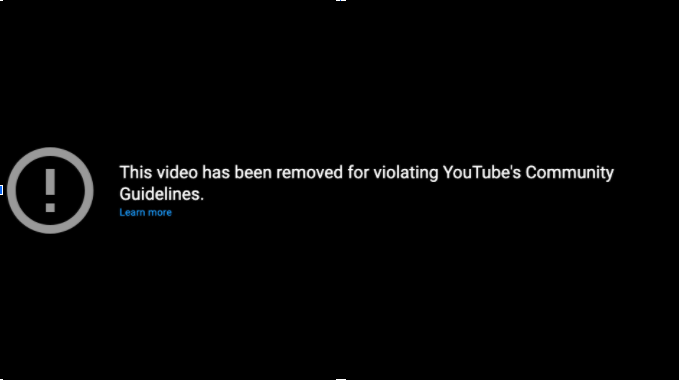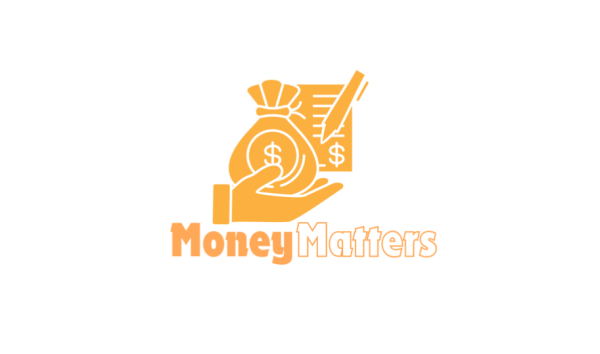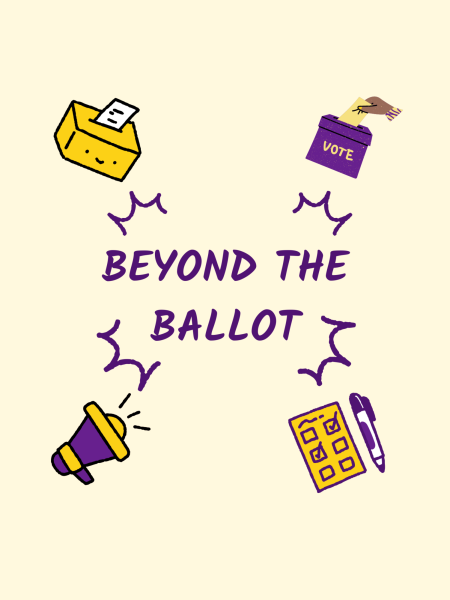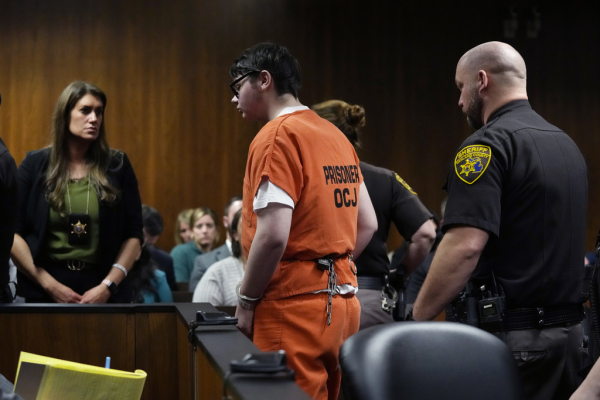The ban against anti-vaccine misinformation on YouTube
A video addressing Rand Paul’s violation of new guidelines set by YouTube that was removed on YouTube for violating community guidelines. Screenshotted by Paige Geanopulos
The Covid-19 pandemic put the world on pause and the development of Covid-19 vaccines helped return society to a somewhat normal state . While vaccines have been shown to reduce the severity of the coronavirus, there have been concerns about the vaccine shared online.
YouTube is a social media platform that people can use as an outlet to discuss opinions, facts, and doubts on the vaccines. This can lead to the spread of inaccurate information about the vaccines, and in response, YouTube enforced anti-vaccine misinformation policies.
The medical misinformation policies on YouTube have expanded since the Covid-19 pandemic, resulting in limited content that opposes public health authorities. Those who give their guidance on treatment, prevention, diagnosis, transmission, the existence of Covid-19, social distancing, or self-isolation guidelines that are not backed up by the local health authorities or the World Health Organization (WHO) will have their content removed, regardless of their credentials. If a content creator continues to go against the Community Guidelines set by YouTube, they run the risk of terminating their channel by receiving three strikes in 90 days.
However, there are exceptions to these guidelines, according to the YouTube misinformation policy. The exceptions that fall under the “Educational, documentary, scientific or artistic content” section of the YouTube help center states, “We may allow content that violates the misinformation policies noted on this page if that content includes additional context in the video, audio, title, or description.”
In addition, according to the vaccine misinformation policy presented by the YouTube help center, “YouTube also believes people should be able to share their own experiences, including personal experiences with vaccinations…we will still remove content or channels if they include other policy violations or demonstrate a pattern of promoting vaccine misinformation.”
This exception entails the possible allowance to give another viewpoint to what health authorities are supporting, debate the information that YouTube prohibits, or display gatherings, such as protests, so long as the videos do not promote misinformation on their policies.
Does this ‘exception’ include unconventional positions that leave room for debate over the continued flow of new data related to the vaccine and virus?
These exceptions were not applied when physician and politician Rand Paul provided additional context about the cloth-mask dangers backed up by Danish and Vietnamese studies. Paul’s position fell under the prevention misinformation category of the Covid-19 medical misinformation policy, which declared that “Claims that masks do not play a role in preventing the contraction or transmission of COVID-19” is misinformation. Because of this violation, YouTube censored Paul’s video.
The YouTube official blog explains how the violations are being dealt with. “We normally rely on a combination of people and technology to enforce our policies. Machine learning helps detect potentially harmful content, and then sends it to human reviewers for assessment.”
Any content that contains violations of the guidelines will be removed quicker than if it was solely based on human review. The number of videos removed from YouTube has increased, and YouTube admits in the YouTube official blog that because of the use of technology, “many videos would not receive a human review, and some of the videos that do not violate our policies would be removed.”
A concern regarding the use of technology over a human review is that the exceptions enforced for content that violates anti-vaccine misinformation policies may be undermined. If an exception is granted by the means of additional context, how is context a factor when using a machine that cannot pick up sarcasm, for example?
These new guidelines create a lack of information for those who need alternatives from the vaccine with religious or medical exemptions. When listing the content that will be banned, the Covid-19 medical misinformation policy includes “content that recommends use of Ivermectin or Hydroxychloroquine for the treatment of COVID-19.”
The article published on April 22, 2021, “Review of the Emerging Evidence Demonstrating the Efficacy of Ivermectin in the Prophylaxis and Treatment of COVID-19,” by the American Journal of Therapeutics, is a source of information that would not be seen on YouTube due to the new policies. According to the conclusion of the National Institutes of Health (NIH) publication, the use of Ivermectin in the 18 controlled treatment trials assisted in the subjects’ recovery time, risks of contracting the virus decreased, mortality declined, and the measure of viral clearance diminished. While there is evidence that Ivermectin is a viable treatment for Covid-19, it is banned from those looking for alternatives on YouTube.
The NIH is a part of the U.S. Department of Health and Human Service. This raises questions about whether YouTube is responsible for determining which health organizations’ data is permissible for publication.
When covering what videos or channels will be banned, The Youtube Official Blog clarifies, “Personal testimonials relating to vaccines will also be allowed, so long as the video doesn’t violate other Community Guidelines, or the channel doesn’t show a pattern of promoting vaccine hesitancy.”
It is conclusive that if a channel was to dedicate its content to the concerning side effects of a vaccine proven by testimonials, it would be considered a violation; however, a video that provides a personal testimonial containing the concerning side effects of their vaccine experience will be allowed, as long as they show no pattern of vaccine concerns.
The YouTube official blog reiterates, “Given the importance of public discussion and debate to the scientific process, we will continue to allow content about vaccine policies, new vaccine trials, and historical vaccine successes or failures on YouTube.”
This social media platform argues that banning anti-vaccine misinformation prevents misguidance from conspiracy theories, inaccurate statistics regarding the vaccine or Covid-19, and inaccurate claims and misconceptions that have not been tested by reliable health organizations or experts.
YouTube is a privately owned company that has the right to limit the content that they do not agree with. Whether they are transparent about what will be banned or not, YouTube is lessening the capacity for debate. Without opposing opinions that challenge the policies related to the Covid-19 vaccine, those with contradictory evidence to the WHO or other organizations will be banned from informing the public.
Hills biology teacher Dr. Martin Edelberg stated, “Claims that there are home remedies that work, or prayer should be used rather than vaccines, claims of guaranteed cures, claims that masks are more harmful than beneficial, or that the vaccines contain tracking devices are not useful and simply serve to prevent people from getting vaccinated, and preventing our chances of living without a pandemic.”
As Dr. Edelberg said, those who use YouTube as an outlet to stop people from receiving the vaccine because of their personal beliefs that provide no reasoning or evidence can harm impressionable minds. Hills is a school full of opinions. Everyone here has an opinion, from students to teachers, but not everyone will agree on vaccines.
The policies created by YouTube represent an accepted viewpoint backed up by the Centers for Disease Control and Prevention (CDC) and the WHO. Ultimately, the policies set by the YouTube team have their pros and cons. The decision to ban anti-vaccine misinformation is what the global health authorities deem as safe and effective to live a Covid-19-free lifestyle.
For more information….
https://support.google.com/youtube/answer/9891785
https://support.google.com/youtube/answer/11161123?hl=en&ref_topic=10833358
https://blog.youtube/inside-youtube/responsible-policy-enforcement-during-covid-19/
https://pubmed.ncbi.nlm.nih.gov/34375047/
https://blog.youtube/news-and-events/managing-harmful-vaccine-content-youtube/

Paige Geanopulos is a senior at Hills. She joined the Trailblazer her freshman year as a staff writer, became the editor for the In-Depth section her sophomore year, and was the editor for the School News section her junior year. This year, Geanopulos looks forward to being the publication's Editor-in-Chief and continuing to write, edit, and manage stories for the Hills community.
Fun fact: Geanopulos has gone cliff diving in Naxos, Greece!













































